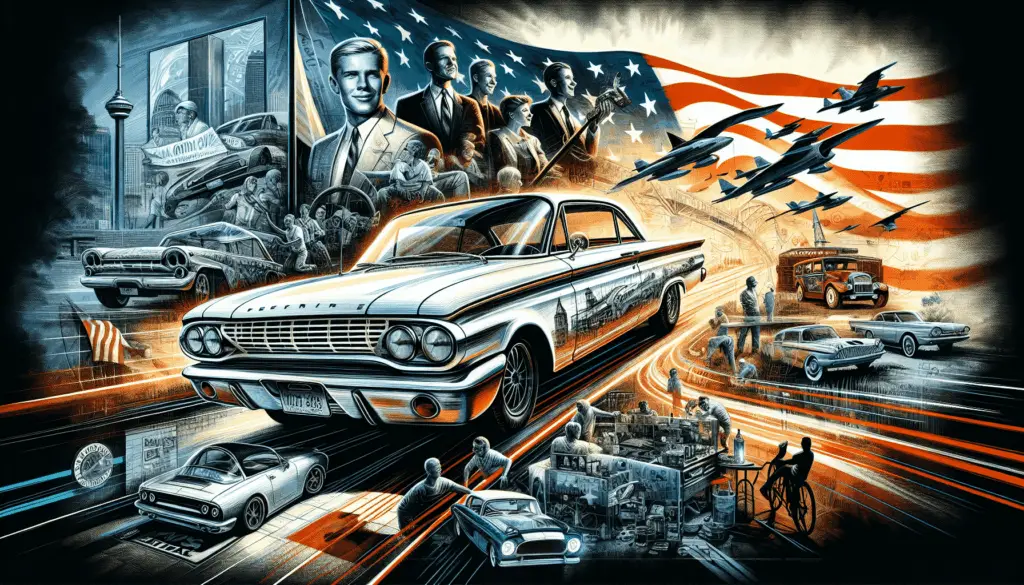In the world of automobiles, few names hold as much significance and influence as Ford. From the iconic Ford Model T to the groundbreaking Mustang and beyond, Ford has left an indelible mark on modern car culture. With innovative technology, sleek design, and a commitment to affordability, Ford has shaped the way we live, work, and travel. Join us as we explore the remarkable journey of Ford’s influence on modern car culture and discover how this legendary brand continues to shape the future of the automotive industry.
Introduction
When it comes to the automotive industry, few names have had as profound an impact as Ford. The Ford Motor Company, founded by the visionary Henry Ford, revolutionized car manufacturing with its innovative techniques and became a symbol of American ingenuity. From the introduction of the assembly line to the creation of affordable and accessible vehicles, Ford has left an indelible mark on the world of automobiles. In this article, we will explore the various ways in which Ford has influenced modern car culture, including its contributions to mass production, affordability and accessibility, technological advancements, racing and sports cars, environmental sustainability, advertising, and its ongoing legacy.
The Ford Motor Company
Henry Ford
To understand the influence of Ford on modern car culture, we must first delve into the life of its founder, Henry Ford. Born in 1863, Ford was an innovative and driven individual who possessed a relentless passion for engineering and automobiles. His vision to create a vehicle that would be accessible to the masses would eventually shape the course of the automotive industry. Ford’s commitment to revolutionizing transportation and improving the lives of everyday people laid the foundation for the company he would create.
Creation of Ford Motor Company
In 1903, Henry Ford founded the Ford Motor Company, which would go on to become one of the largest and most successful automakers in the world. The company’s initial focus was on producing gasoline-powered automobiles, offering customers a range of models that catered to their various needs. Through strategic partnerships and innovative engineering, Ford Motor Company quickly established itself as a key player in the rapidly evolving automotive landscape.
Growth and Expansion
Under Henry Ford’s leadership, the Ford Motor Company experienced steady growth and expansion. By implementing efficient production methods, Ford was able to increase productivity and reduce costs, making their vehicles more accessible to a wider audience. This commitment to growth and affordability would shape the future of the company and pave the way for its revolutionary contributions to the automotive industry.

Mass Production and the Assembly Line
Introduction of the Assembly Line
One of Ford’s most significant contributions to modern car culture was the introduction of the assembly line. In 1913, Ford implemented an innovative production process that allowed for the mass production of automobiles. By breaking down the manufacturing process into smaller, specialized tasks, workers could complete their assigned tasks more efficiently, resulting in a significant increase in production speed. This groundbreaking approach not only streamlined the manufacturing process but also reduced costs, making cars more affordable to the average consumer.
Impact on Car Production
The introduction of the assembly line revolutionized car production. What had once been a slow and labor-intensive process became a highly efficient and streamlined operation. The ability to produce vehicles at a faster rate allowed Ford to meet the growing demand for automobiles, ultimately changing the face of transportation. The impact of mass production on car production cannot be overstated, as it not only transformed Ford Motor Company but also influenced the entire industry to adopt similar production methods.
Influence on Other Industries
Ford’s assembly line techniques had a far-reaching impact beyond the automotive industry. The principles of mass production and efficient task specialization pioneered by Ford became known as Fordism. This concept quickly spread to other industries, including manufacturing, electronics, and even food production. The assembly line revolutionized the way products were made, increasing efficiency, lowering costs, and creating more accessible goods for consumers around the world. Ford’s influence on other industries is evident in the way we produce and consume products to this day.
Affordability and Accessibility
Introduction of Model T
In 1908, Ford introduced the Model T, a groundbreaking vehicle that would forever change the landscape of the automotive industry. The Model T was designed to be affordable and practical, making it accessible to the average person. This marked a significant departure from the luxury-focused approach of other automakers at the time. With its reliable performance, simplicity, and affordability, the Model T quickly gained popularity and became a symbol of Ford’s commitment to making transportation accessible to all.
Lowering the Cost of Cars
Ford’s commitment to affordability extended beyond the introduction of the Model T. Through continuous innovation and improved production methods, Ford was able to lower the cost of their vehicles, making car ownership a reality for an increasing number of individuals. By embracing economies of scale, optimizing production processes, and reducing waste, Ford Motor Company was able to offer their vehicles at a price that was within reach for the average consumer.
Expansion of Car Ownership
The affordability of Ford vehicles played a crucial role in expanding car ownership. With the introduction of the Model T and subsequent models, more and more people were able to own a car, shifting the perception of automobiles from luxury items to practical necessities. Ford’s commitment to accessibility and affordability paved the way for a new era of personal transportation, connecting communities and empowering individuals with newfound mobility and freedom.

Innovation and Technological Advancements
Introduction of Ford V8 Engine
Ford has long been at the forefront of technological innovation in the automotive industry. One of their most significant contributions was the introduction of the Ford V8 engine in 1932. This groundbreaking design featured eight cylinders arranged in a V shape, allowing for increased power and performance. The Ford V8 engine marked a significant advancement in automotive engineering and solidified Ford’s reputation as a leader in technological innovation.
Safety Features
Ford has always prioritized the safety of its customers, introducing numerous safety features that have become standard in modern cars. From the introduction of safety glass and seatbelts to the implementation of advanced collision avoidance systems, Ford has continuously pushed the boundaries of safety technology. By prioritizing the well-being of their customers, Ford has set the standard for safety in the automotive industry.
Influence on Automotive Technology
Ford’s commitment to innovation has had a profound influence on the development of automotive technology. From the invention of the assembly line to the implementation of advanced safety features, Ford has consistently pushed the boundaries of what is possible in the industry. Many of the technologies we take for granted today, such as power steering, air conditioning, and GPS navigation, can be traced back to Ford’s innovative spirit. The continual pursuit of technological advancements has cemented Ford’s position as a driving force in the automotive world.
Cultural Impact
Automobile as a Symbol of Freedom
The advent of the automobile brought with it a newfound sense of freedom and independence. No longer bound by the limitations of public transportation, individuals were able to explore new horizons, connect with others, and forge their own paths. The widespread adoption of Ford vehicles, with their accessibility and affordability, democratized transportation and allowed people from all walks of life to experience the freedom that came with car ownership. The automobile became a symbol of personal liberty and an embodiment of the American dream.
Car Ownership as a Status Symbol
Owning a car, particularly a Ford, became a status symbol in American culture. The accessibility and affordability of Ford vehicles made car ownership a tangible goal for many individuals, and owning a Ford signified a certain level of success and achievement. The sleek and stylish designs of Ford cars, combined with their performance and reliability, enhanced the desirability of owning a Ford and solidified its status as an iconic symbol of American ingenuity.
Car Culture and Movies
The influence of Ford on modern car culture can also be seen in the realm of movies and popular culture. From the iconic Ford Mustang in “Bullitt” to the futuristic vehicles in the “Back to the Future” series, Ford cars have often taken center stage on the silver screen. These appearances have helped to further cement Ford’s place in popular culture and reinforce the ideals of freedom, adventure, and American spirit that are often associated with car ownership.
Racing and Sports Cars
Ford in Motorsports
Ford’s influence on modern car culture extends beyond the everyday streets and highways. The company’s involvement in motorsports has left an indelible mark on the racing world. From the legendary victories at Le Mans to the dominance of the Ford Mustang in various racing series, Ford has a rich history in motorsports. The success of Ford in racing has not only solidified their reputation for performance and innovation but has also shaped the way the world perceives American automotive excellence.
Ford Mustang – An Icon
One cannot discuss Ford’s influence on modern car culture without mentioning the Ford Mustang. Introduced in 1964, the Mustang quickly became an iconic sports car that captured the hearts of auto enthusiasts around the world. Its sleek design, powerful performance, and affordability made it an instant classic. The Mustang’s enduring popularity throughout the years has solidified its status as an American automotive icon and a symbol of American muscle and performance.
Influence on Sports Car Culture
The introduction of the Mustang and Ford’s involvement in motorsports significantly impacted sports car culture. The accessibility of the Mustang, combined with its performance capabilities, appealed to a wide range of car enthusiasts, from casual drivers to dedicated gearheads. Ford’s commitment to creating high-performance vehicles that are accessible to the masses helped shape the sports car landscape, inspiring other automakers to follow suit and pushing the boundaries of performance and design.
Ford and the Environment
Introduction of Hybrid and Electric Vehicles
Recognizing the need for environmentally friendly alternatives, Ford has made significant strides in the development of hybrid and electric vehicles. The introduction of the Ford Escape Hybrid in 2004 marked a significant milestone in Ford’s sustainability efforts. Since then, Ford has continued to invest in hybrid and electric technology, with models like the Ford Fusion Hybrid and the all-electric Ford Mustang Mach-E. By offering eco-friendly options, Ford has contributed to the growing movement towards greener transportation.
Investment in Sustainable Technologies
Beyond hybrid and electric vehicles, Ford has also made significant investments in sustainable technologies. From researching more sustainable materials for vehicle production to implementing energy-efficient manufacturing processes, Ford is dedicated to reducing its environmental impact. This commitment extends to the development of alternative fuels, such as hydrogen, and exploring ways to make their manufacturing operations more sustainable. By prioritizing sustainability, Ford is playing a crucial role in shaping the future of environmentally conscious transportation.
Impact on Green Car Movement
Ford’s commitment to sustainable transportation has had a ripple effect on the green car movement. By introducing hybrid and electric vehicles into their lineup, Ford has made eco-friendly options more accessible to consumers. This increased availability has helped to normalize the use of sustainable technologies in the automotive industry and has inspired other automakers to follow suit. Ford’s dedication to the environment has acted as a catalyst for change within the industry, pushing for a more sustainable future.
Ford’s Influence on Advertising
Innovative Advertising Campaigns
Ford has a long history of innovative and memorable advertising campaigns that have left a lasting impact on the industry. From the iconic “Built Ford Tough” slogan to the emotionally resonant “Go Further” campaign, Ford has consistently demonstrated a knack for connecting with consumers on a deeper level. By combining compelling storytelling, bold visuals, and a strong brand identity, Ford has created advertising campaigns that have resonated with audiences worldwide and helped to shape the way automakers market their products.
Use of Sponsorship and Endorsements
Ford has also utilized sponsorship and endorsements as a means of expanding its reach and influence. From its partnership with professional sports teams to collaborations with celebrities, Ford has strategically aligned itself with individuals and organizations that share its values and appeal to its target audience. These partnerships have helped to further elevate Ford’s brand image and associate the company with success, performance, and achievement.
Impact on Marketing Strategies
The innovative advertising campaigns and strategic endorsements embraced by Ford have had a significant impact on marketing strategies within the automotive industry. Ford’s ability to connect with consumers on an emotional level and foster brand loyalty has become a benchmark for other automakers. The emphasis on storytelling and forging a personal connection with consumers has reshaped the way cars are marketed, focusing on the experience and emotions associated with car ownership rather than simply the features and specifications.
Legacy and Future of Ford
Continued Innovation and Sustainability
As Ford moves forward, its commitment to innovation and sustainability remains steadfast. The company continues to invest heavily in research and development to push the boundaries of automotive technology. Ford’s focus on electric and autonomous vehicles showcases its dedication to the future of transportation and the ongoing quest for a sustainable automotive industry. By combining innovative engineering with a commitment to environmental responsibility, Ford is poised to leave a lasting impact on the future of mobility.
Ford’s Impact on Future Car Culture
Ford’s influence on modern car culture is undeniable, and this influence will undoubtedly continue to shape the future. The company’s commitment to accessibility, affordability, and technological advancements has had a profound impact on the way we perceive and interact with automobiles. As the automotive industry evolves, Ford’s legacy will continue to inspire innovation, shape consumer expectations, and drive the development of future technologies and mobility solutions.
Challenges and Opportunities
Although Ford has achieved great success throughout its history, the company faces numerous challenges and opportunities in the modern automotive landscape. From increasing competition to the rapid advancement of technology, Ford must navigate a rapidly changing industry while staying true to its core values. By embracing challenges as opportunities for growth and continuing to prioritize innovation and sustainability, Ford can build upon its legacy and continue to shape the future of car culture.
In conclusion, Ford’s influence on modern car culture cannot be overstated. Through its revolutionary manufacturing techniques, commitment to affordability and accessibility, technological advancements, contribution to racing and sports car culture, dedication to environmental sustainability, innovative advertising, and lasting legacy, Ford has left an indelible mark on the world of automobiles. As we move forward, it is clear that Ford’s impact will continue to shape the future of car culture, inspiring innovation, and influencing the way we think about transportation and mobility.


